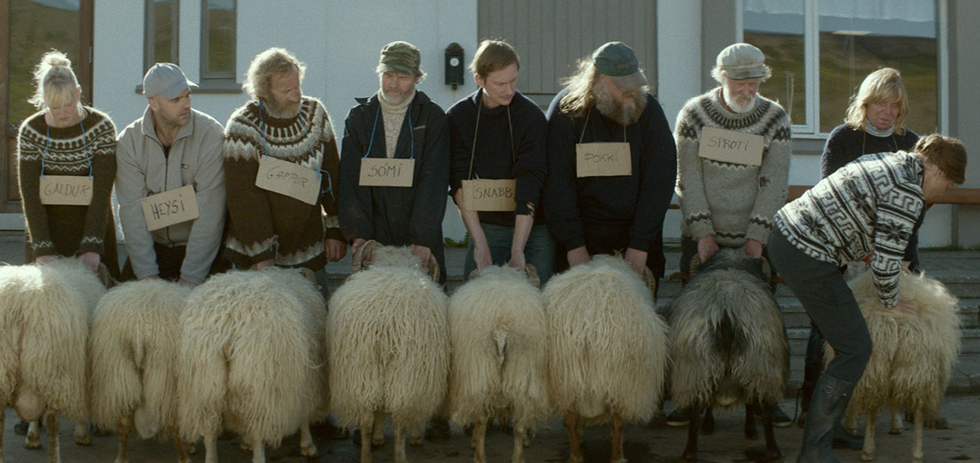
Iceland’s first ever win in the Un Certain Regard section of the Cannes Film Festival came earlier this year in the form of Grímur Hákonarson’s Rams, which took out the top prize. That section, which runs parallel to the Palme d’Or and is designed to promote innovative young voices in world cinema, boasts an eclectic list of winning films and directors, with 2009 winner Yorgos Lanthimos (for Dogtooth) and 2012 winner Michel Franco (for After Lucia) each having a film up for the Palme this year. In that vein, Un Certain Regard is something of a stepping stone, a means of catching the attention of the international film festival circuit en route to top honours at the Croisette. What’s surprising, then, is how little Rams seems to fit into the theoretical mould of an Un Certain Regard winner. Hákonarson is a reasonably new director, with Rams only his second feature film (though he has made three full-length documentaries as well), yet his film is relatively conventional – a simple story of family, isolation and desperation that’s lifted by a strong central performance and a haunting score, whilst being marked as distinct through the sparseness of the barren Icelandic landscape. Whilst it does succeed as a wryly comic character study it seems to have no ambition to be anything more and, as the narrative cogs become readily apparent in the film’s second half, it seems less worthy of a major international prize than a smattering of polite applause.
Gummi (Sigurður Sigurjónsson) has not spoken to his older (and much larger) brother Kiddi (Theodór Júlíusso), we’re told, for 40 years. They live as neighbours on their family’s large farming land in a remote Icelandic valley, they both raise sheep and rams, which they enter in an annual competition held in the region. Outside of speaking to one another through written messages delivered by Kiddi’s dog, the competition serves as one of the rare moments where they will have to be in the other’s company for some time. Whilst they maintain their respective stoicism, when Kiddi narrowly bests Gummi for first prize, simmering fraternal tensions rear their head. Gummi secretly searches his brother’s ram for defects whilst the rest of the competitors are celebrating inside and discovers that it has scrapie, a contagious degenerative disease that affects sheep. This revelation places the valley in lockdown, as veterinarians suggest they slaughter all of their current stock.
Like Hákonarson’s previous feature, the light comedy Summerland, his latest is also concerned with economic decline and the way in which family structures respond to financial incentive. For Gummi and Kiddi, money is irrelevant, and they are drawn together through their resistance to these authorial forces, though that is tempered by their underlying obedience to the legacy of their father, with the head of his most famous ram mounted in Gummi’s living room. The other farmers in the valley, ranging from a young couple seeking escape from the city to those who have never left the valley in their lives, are forced to grapple with the crushing implications of two years without their flock, something even more potent for the staunchly isolationist brothers. Both Sigurjónsson and Júlíusso deliver gradually complex performances, Sigurjónsson in particular, whose true sorrow is almost entirely shielded from us in spite of the intimacy of the narrative that surrounds him; he appears as a surprisingly spry man fueled by quiet desperation and a passionate love for only one thing in life.
Icelandic composer Atli Örvarsson, whose back catalog is a bizarre run of failed Hollywood B-movies like Vantage Point and The Eagle, does some very impressive work scoring this film, his accordion line giving the film a strange gothic quality throughout. Sturla Brandth Grøvlen, the cinematographer who masterfully shot one-take film Victoria and the intimate and underseen documentary The Agreement, does some pleasant if disappointing work on Rams. Despite some very beautiful establishing shots of the landscape – the persistent sense of being trapped behind the valley is one of the film’s great strengths – he is given very little room to experiment with form. Everything is basked in a clean Scandinavian light but the approach to framing is likewise clean and less engaging than anticipated. This shifts, though, in the chaotic and impressive climax of the film, with Grøvlen managing to capture some bracing visuals amidst an all-encompassing blizzard.
All of this is to say that Rams is impressive, yet tethered to its quiet simplicity, though it is bound to resonate strongly for some viewers. Its setting and narrowed focus appears to define it clearly enough from other films of this ilk, though it feels like a less nuanced incarnation of Sebastien Pilote’s underrated Le démantèlement, a pastoral drama about family and personal debt, which played at Cannes Critics’ Week in 2013. Grímur Hákonarson’s sense of character and intimacy does shine through, though, likely honed through his documentary work (in particular the recent A Pure Heart) and so sees Rams transcend, if only slightly, its bare bones plot.
Around the Staff
| Felix Hubble |
